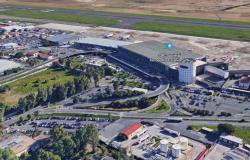
The place required a civil and respectful confrontation in tone. Requests respected. This is also thanks to the strict rules of engagement: three minutes each to answer questions, no possibility of reply and ban on interaction with the public. Thus, on Monday, the last face-to-face meeting between the four mayoral candidates of Cesena took place in the Meeting Room of the Seventh-day Adventist Church in Case Finali. In front of an audience of about a hundred people, Enzo Lattuca candidate for the center-left; Marco Casali, center-right; Marco Giangrandi candidate of Cittadini al centro and Paolo Sensini list For Peace and the Common Good-Cesena Viva e Unita explained their proposals on various topics.
The programs
To break the ice we start with a brief presentation of the candidates, lists and key points of the programmes. We go in alphabetical order. Marco Casali takes the floor: «As a centre-right coalition we are a solid and close-knit team based on values shared for five years». There are five macro-themes that he indicates as fundamental: «Public order, mobility for all, environmental safety, family and birth rate, infrastructure». The coalition that supports Marco Giangrandi places itself in a “centre” position: «Among the essential issues for us are the housing emergency, the social, the environment, the need to renew mobility and make people increasingly participate in the political life of the Municipality all the neighborhoods”. Pd candidate Enzo Lattuca is succinct: «Services for the elderly, mobility, climate change and scrupulous attention to the less well-off». Paolo Sensini closes the round: «We are the only list that fought against the healthcare dictatorship – he explains – we are against the digital dictatorship, against the environmental dictat». In a climate of European elections he says: «it is urgent to help the productive realities affected by wrong and denigrating policies imposed from above by a ruthless Europe».
Poverty: what solutions
The first topic of the debate is the increase in poverty. How to counter it? Casali begins again by underlining «the merit of a Cesena community rich in solidarity». Often, however, “restrained in its initiatives by an oppressive public institution”. The Administration, according to the centre-right, «should invest resources in poor workers, who, despite having a job, are unable to meet family needs; on the training of those who do not work and on the integration of non-EU workers”. Lattuca brings to the attention of the audience the path followed by his council in the first mandate: «We are trying to help all those families who have their own financial support, but not enough to cover all the expenses, a gradual process is underway with the assistants social because these people often have difficulty emancipating themselves from their condition.” He then addresses a criticism to the higher levels of the institutions: “Having canceled the citizen’s income without proposing a replacement instrument has increased the problem.” «There is no need to spend and waste – Sensini replies loudly -. Targeted interventions are needed. The Municipality must be the first point of reference for contributions, but with the aim of stimulating the forces that can help.” Again on the European Union: «We must understand that a Municipality does not have infinite strength to fight the heartbreaking policies of a hegemonic Europe». The issue of housing becomes essential for Giangrandi: «if we deny those who have the right to live in a rent-controlled house we are not tackling poverty». The idea of Cittadini al Centro is to stimulate a reaction: «we need people’s redemption, not a perpetual subsidy and the house is the useful means».
Home emergency
The housing question animates the following passage. «It is the main problem» states Giangrandi and indicates as one of the triggering factors the safeguard clause introduced by the Lucchi Council in 2014. «The Novello Project – he continues – was supposed to be the Social Housing model; of those 100 apartments planned, not a single one has been seen. The housing emergency will grow, needs will change and we will not be able to cope.” «We started talking about Social Housing right away – replies Lattuca -. During this legislature we have made 50 ERP apartments available to the assignees and we must renovate the closed ones that request it. We have built housing units in Case Finali and Calisese suitable for disabled people who today can afford to live alone.” On Novello: «200 apartments will be built and rented at a rent of 5 euros per square meter». “If today Cesena has 700 less social housing units than Forlì it’s because whoever was supposed to didn’t take care of it” accuses Casali. Which suggests: «rethink the former Peep of Sant’Egidio which would provide 300 homes. The project exists but it remained buried in some municipal office.” Then: «We need to move towards housing reuse that involves the city center and the countryside». Work, integration and home must go hand in hand for Casali: «entrepreneurs must be allowed to use part of their property as guest quarters for their employees while waiting for them to find permanent accommodation». Similar line for Sensini: «There is no need for concrete pouring. We have to make the most of what we have.” The idea: «to network and create mechanisms between the Administration and citizens; we need to create compensation between supply and demand.”
Young
Involving young people in the common and political life of the city is an important element for all the coalitions interested in the electoral round. Lattuca thinks that «drawing kids as distracted, removed from context, afflicted by problems is wrong and surreal». “It shows that someone is getting old” – the mayor comments mockingly. Casali believes that it is necessary to “separate youth hardship and social confinement”. Solution? «The kids must find moments of aggregation. They demonstrated it in the flood emergency.” And therefore: «involve them in Civil Protection projects, give them spaces where they can meet as could be the Foro Annonario which, however, until 2057 will be hostage to large-scale distribution due to a noose contract signed by previous administrations». Giangrandi agrees, but he goes a step further: «we need to give kids a reason to go to these places; we can do it with sport, culture, art and work.” Furthermore: «We propose a connection between school, adults and business – continues Giangrandi -. Companies must enter schools and talk to children. They are the productive future.” For Sensini, the underlying cause of youth distress can be found: «in social indices – he says -. They show that young people have unprecedented psychological problems due to what they have suffered with the pandemic. Forced to stay at home alone for a problem that didn’t concern them at all.” Lattuca agrees on the attention to be paid to the mental health of young people, but with other developments: «They need our support and some activities such as the summer “State Attivi” also move in this direction».
Third sector and volunteering
The meeting ends with a discussion on private citizens who dedicate themselves to the community. No doubt for Sensini: «Without the citizens’ contribution we would never have recovered from the flood». And for this reason his list aims at «a “pact with the citizens” to free energy and harmonize everyone’s work». For Casali: «the Participation Code drawn up by the Municipality must be reviewed. There is a fertile community, but the Administration is not capable of relating to it.” He closes on schools: «educational equality must be guaranteed to families who make a “different” educational choice for their children». For Giangrandi «there is a need for a social consultation that involves all the subjects. We need to build a common network capable of collecting and sharing data and projects.” In a word, “co-planning” between the public, private and community as a whole. Lattuca is not entirely in agreement and underlines that his council has already set up joint tables on the matter. «The cooperation and co-planning table exists and with the associations involved we carry out constant monitoring and development work on the needs of the community». He gives the example of nursery schools affiliated with religious communities – nursery and nursery school in the parish of Case Finali. The centre-left’s idea is “to help, but not replace those who already promote actions in the social sphere”.





